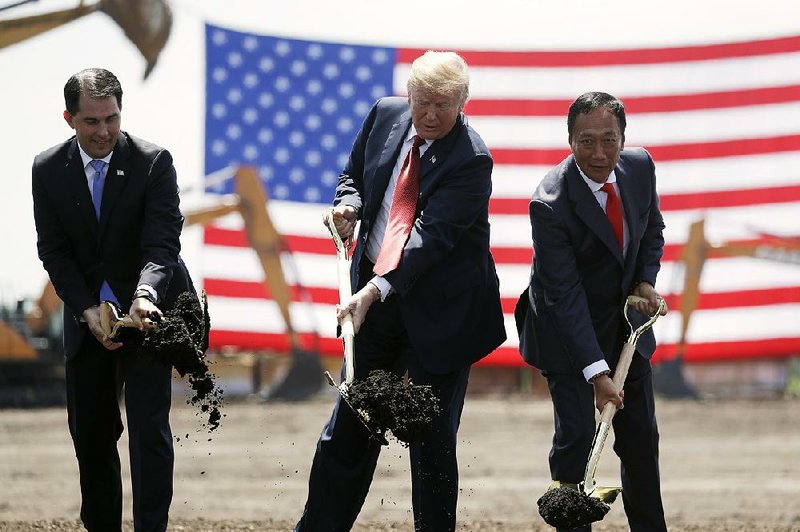A major jobs deal that President Donald Trump has touted with former Wisconsin Gov. Scott Walker now looks uncertain.
Foxconn, a supplier for Apple and other technology firms, said it's scrapping plans to build a new factory in Wisconsin, opting to hire American engineers and researchers instead of thousands of blue-collar workers.
"In Wisconsin we're not building a factory," Louis Woo, special assistant to Foxconn chief executive Terry Gou, told Reuters. "You can't use a factory to view our Wisconsin investment."
The Taiwanese technology juggernaut initially pledged in 2017 to construct a $10 billion liquid-crystal display-panel plant and create up to 13,000 factory jobs in the state's southeastern corner over the next 15 years. The positions would pay an average annual wage of $53,000, the firm said -- a solid salary in the manufacturing realm. Under the contract, however, Wisconsin would cancel some payouts if Foxconn did not stick to its word.
It had already fallen short last year, hiring 178 full-time employees rather than the 260 targeted, and failed to earn a state tax credit worth up to $9.5 million.
Wisconsin state and local governments promised roughly $4 billion to Foxconn, the largest incentive in state history and the biggest pledged by a state to a foreign corporation in U.S. history.
The deal drew criticism at the time after it emerged that Wisconsin would not make money for 25 years.
Foxconn later acknowledged that its plans were under transition. Rather than hiring 13,000 factory workers, the company said months ago that the vast majority of roles would likely consist of "knowledge" workers, high-skilled engineering positions, since much of its plant's manufacturing operations would be automated.
The company also revealed that it would instead be building a smaller-scale liquid-crystal display factory in southeastern Wisconsin than it committed to in the contract with the state, in order to remain cost competitive with China.
State officials said Wednesday that Foxconn will not qualify for tax incentives until the company meets its job creation and facility investment targets.
"WEDC's performance-based contract with Foxconn provides the company the flexibility to make these business decisions, and at the same time, protects Wisconsin's taxpayers," said Kelly Lietz, vice president of marketing at the Wisconsin Economic Development Corp..
In the statement, she added: "Foxconn's long-term success both globally and within Wisconsin is centered around the alignment of its business model with ever-changing global economic conditions, including evolving customer demands."
Foxconn and the White House did not immediately respond Wednesday to requests for comment.
Rep. Mark Pocan, D-Wis., who asked the U.S. Government Accountability Office in November to investigate the Foxconn deal and other state subsidy packages, said Wisconsin has already poured cash into new roads, into campus construction and into paying families who lived on the tentative factory site to move. He declined to name a figure.
"These companies play communities against each other to get the very best deal at the expense of the taxpayer, and they don't live up to the deal they promised," Pocan said.
Trump celebrated the deal in the East Room of the White House in 2017 and attended a groundbreaking ceremony last summer in Racine County.
"I would see Terry, and I would say, 'Terry, you have to give us one of these massive places you do great work with,'" he said two years ago in front of news cameras, adding that he told the company head: "The American worker will not let you down."
Though Woo suggested Wednesday that there are no plans to give up on the planned facility entirely, the company is assessing what liquid-crystal display technology is best suited for the project, in part because of ongoing supply-chain challenges.
"Given global economic conditions and the trade tensions between China and the U.S., we have to be responsible to our employees and customers, and it's impossible that we can always stay committed to our original plan without any change," Woo said. "There is no scrapping of our plans. We are upholding our commitment to Wisconsin."
Foxconn grabbed headlines in 2013 when it unveiled plans to invest $30 million and generate 300 jobs at a new high-tech factory in central Pennsylvania. The state's governor applauded the news, and economists predicted that Foxconn would lead a local manufacturing revival.
But after the spotlight faded, Foxconn dropped its plans in the state.
Trump and Walker's deal with the company also sparked criticism.
Wisconsin's nonpartisan Legislative Fiscal Bureau predicted that the move wouldn't mean profits for the state until 2042.
Walker lost his race in November to Democrat Tony Evers, who has slammed the Foxconn deal as a "hail Mary pass on the part of the governor."
Wisconsin's offer of economic sweeteners to Foxconn was unprecedented in scale, analysts say. The bundle of financial incentives was larger than what New York, Virginia and Tennessee collectively pledged to Amazon to win its new offices, a Washington Post comparison of the two development projects showed.
Information for this article was contributed by Danielle Paquette of The Washington Post and by Scott Bauer of The Associated Press.
Business on 01/31/2019
